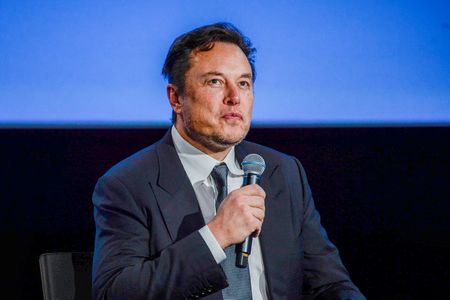By Simon Jessop and Ross Kerber
(Reuters) -Billionaire Elon Musk said in a tweet that advisers that make recommendations to shareholders on how to cast their votes at company meetings had too much power because of their influence on passive investment funds.
Musk’s comments add to a long-running debate over whether such advisers have too much sway over corporate decision-making.
In a tweet late on Monday Musk said: “Far too much power is concentrated in the hands of ‘shareholder services’ companies like ISS and Glass Lewis, because so much of the market is passive/index funds, which outsource shareholder voting decisions to them.”
ISS, or Institutional Shareholder Services, declined to comment. Glass Lewis also declined to comment.
Proxy advisers led by ISS and Glass Lewis give recommendations to clients such as pension schemes on how they should vote on everything from electing board members to signing off on executives’ pay and perks.
Musk, who owns Twitter and heads electric carmaker Tesla,, was replying to a Twitter thread begun by Vivek Ramaswamy, the founder of Strive Asset Management, who said it was “staggering” how much influence the biggest adviser, ISS, had on U.S. state investors, treasurers and companies.
The comments are the latest complaint by Musk about the functioning of markets and follow previous criticism over the way electric vehicle company Tesla, which he controls, is assessed by investors from an ESG perspective.
In the past, most criticism of the two proxy advisers has come from corporate executives when the advisers have urged shareholders to vote against board recommendations, and from climate activists seeking support for environmental resolutions.
Academic reviews have found mixed evidence about the proxy advisers’ impact. Jill Fisch, a professor of law at the University of Pennsylvania, in a 2010 paper estimated an ISS recommendation shifted 6% to 10% of votes.
She said via e-mail on Tuesday the percentage now is likely to be lower as internal vote reviews done by top investors have become more sophisticated.
U.S. Republican state officials have also weighed in, writing to the two advisory firms asking if their recommendations met their obligations to investors.
Contrary to Musk, however, Republicans at the state and national level have also charged top passive fund managers themselves have grown too aggressive with their proxy votes, a claim fund managers deny.
Tesla has faced its own disagreements with the proxy advisers. Last year, for instance both ISS and Glass Lewis backed an advisory proposal to increase investors’ ability to nominate directors and recommended votes against two Tesla directors up for a vote over the board’s “insufficient responsiveness” to a prior shareholder vote.
The shareholder resolution passed and the two directors received support of 68% and 64% of votes cast, lower than typical for major corporations.
(Reporting by Simon Jessop and Ross Kerber; Editing by Sharon Singleton and Jane Merriman)


